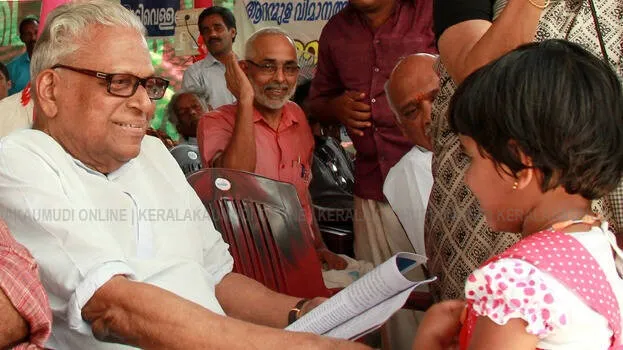

VS Achuthanandan assumed office as the Chief Minister of Kerala in 2006. However, he should have become Chief Minister ten years earlier — in 1996, to be exact. The reason he lost power when it was almost within reach was the intense factionalism within his own party.
At the time of the 1996 elections, VS was undeniably the number one leader in the party. He was so powerful that no one dared to question him. He contested from Mararikulam, a stronghold of the Left. Everyone was certain that he was the next Chief Minister of Kerala. But when the results came, VS suffered a shocking defeat. He lost by 1,965 votes to Congress candidate P. J. Francis. This was the same Mararikulam constituency where VS had won by 9,980 votes in the 1991 election. The defeat was not just unexpected for VS but also deeply shocking for the party. In his absence, E. K. Nayanar became the Chief Minister.
In the internal party inquiry that followed, VS's election campaign secretary T. K. Palani was blamed for the defeat and demoted within the party. VS himself lodged a complaint with the leadership, naming Palani. Disciplinary action was also taken against a few others.
Political journey that began with defeat
VS's electoral politics began with a loss. In 1965, he contested from his home constituency of Ambalapuzha and lost to K. S. Krishnakurup of the Congress. But in 1967, he bounced back by defeating A. Achuthan of the Congress and entered the Legislative Assembly. He went on to serve as the Leader of the Opposition three times. His interventions in that role earned him widespread attention and played a key role in his growing popularity among the public.
At the age of eleven, VS lost his father, forcing him to drop out of school. He began working in a textile shop as an assistant to his elder brother. Later, he took up a job in a coir factory. It was there that the leader and organiser in VS truly awakened. He experienced firsthand the hardships and oppression faced by workers, which shaped his worldview and political consciousness.
When the Nivarthana agitation erupted in his hometown, VS was drawn to the movement and joined the State Congress in 1938. By 1940, he became a member of the Communist Party. In 1946, under the party’s leadership, the Punnapra-Vayalar uprising took place. VS was one of the key participants in the struggle. While underground, he was arrested in Poonjar and subjected to brutal torture. Despite being interrogated about the party and its leaders, VS did not utter a word.
Inside the prison, his legs were tied and beaten with batons. When he lost consciousness, a bayonet was thrust into his leg. The scars, which pierced through one side of his foot and exited the other, remained with him for life. Later, when he became delirious with fever and fell unconscious, the police assumed he had died and left him. According to VS himself, it was a thief who had been arrested by the police who ended up saving his life.
Over time, VS grew to become a formidable force within the Communist Party. There was hardly a position he didn’t hold — Chief Minister of Kerala, Leader of the Opposition, Party State Secretary, and LDF Convener, to name just a few.